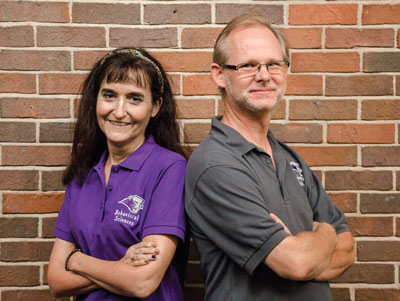By Denise Elson Tucker ’89
Life for a college student is difficult enough without a global pandemic being thrown into the mix. At SBU, students have counseling services available to them to not only deal with everyday issues, but those related to the remote learning that ended the Spring semester because of COVID-19.
 Dr. Debbie Walker ’87, a licensed psychologist and coordinator of the SBU Counseling
Services for the past five years, manages more than a full caseload during a regular
semester with the help of Bill Walkup ’83, a licensed clinical social worker and assistant professor of psychology at SBU,
as well as three master’s-level counseling interns from neighboring universities.
Dr. Debbie Walker ’87, a licensed psychologist and coordinator of the SBU Counseling
Services for the past five years, manages more than a full caseload during a regular
semester with the help of Bill Walkup ’83, a licensed clinical social worker and assistant professor of psychology at SBU,
as well as three master’s-level counseling interns from neighboring universities.
With campus being closed and classes moved to online delivery because of COVID-19, SBU Counseling Services had to find a way to deliver its services.
“Right before Spring Break, we learned that our break would be extended by one week, so I began realizing at that point, chances were we would need to implement some telehealth services,” Walker said. “I looked into Zoom, but the free version of Zoom we have is not really HIPAA (Health Insurance Portability and Accountability Act) secure and HIPAA compatible. So, I had colleagues sending me information about free webinars, which are not generally free. But, during the COVID crisis, many of these agencies, including the American Psychological Association (APA), offered free training for telehealth.
“Over Spring Break, myself, Mr. Walkup and my three interns, as well as Jennifer Maloney on our Springfield campus, registered for all the telehealth training so that we could begin implementing. It was a process — hours and hours of training, getting ourselves ready. It requires all new consents because the students have consented to in-person treatment, they have not consented to telehealth. We had to send students a document, which they signed electronically consenting to telehealth.”
Walker also said there are some things Counseling Services was not able to do through telehealth.
“We tried very hard to continue working with the students who were already receiving our services on a case-by-case basis,” Walker said. “Our students who went back home out of state, we were not able to continue services for them because we’re licensed only in Missouri.
“I ended up researching their community, trying to figure out what was close to them. If a student had insurance, I could do some research and see which providers were within their network and what the options were for the student.”
Walker said that while having the technology available to be able to continue providing mental health services to students during the pandemic, nothing beats the benefits of in-person classes and counseling sessions.
“There was so much isolation, just no contact all of a sudden with your classmates and with your friends,” Walker said. “The seniors, especially, there were people they just simply weren't going to see in person anymore because that was just it. There’s just no substitute for that in-person interaction, even if you are having to maintain physical distance of 6 feet. You’re still in the presence of other people, and there’s that potential for dialogue, that potential for interaction, and just the energy exchange between people.”
Walker has been impressed with the flexibility and adaptability of everyone on campus during the pandemic, and considers SBU a pro-mental health campus.
“I know there’s still stigma and that’s something we’ve been battling since I entered this profession, but it’s generally a very pro-mental health campus,” Walker said. “Student Life and our resident directors are very well trained to spot problems, and they’re very quick to refer.
“I think the faith community, in general, may have room for growth in that area, but I think SBU, specifically, is maybe a little bit ahead of the game. They’re very, very supportive of mental health efforts.”
*Published: 7-21-2020
